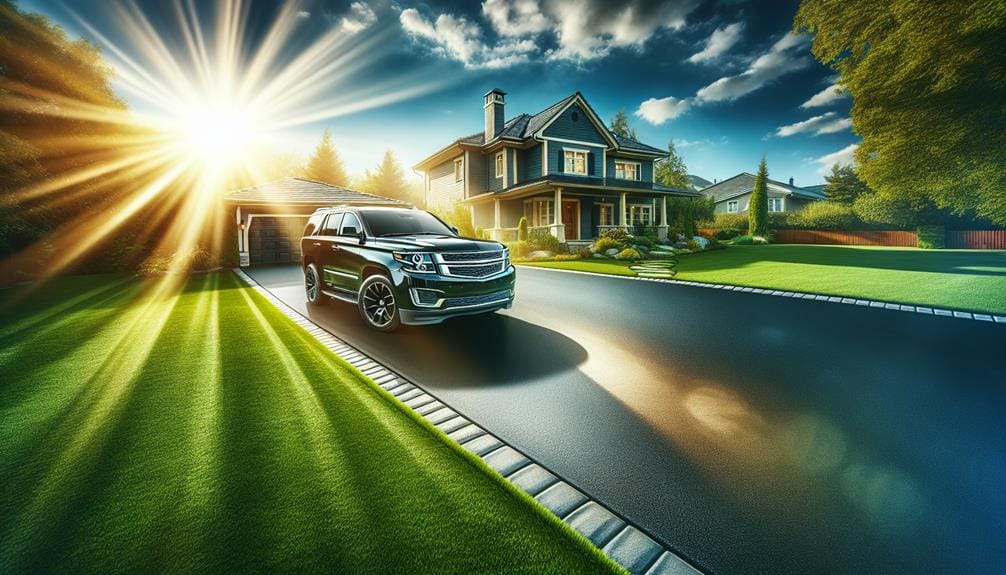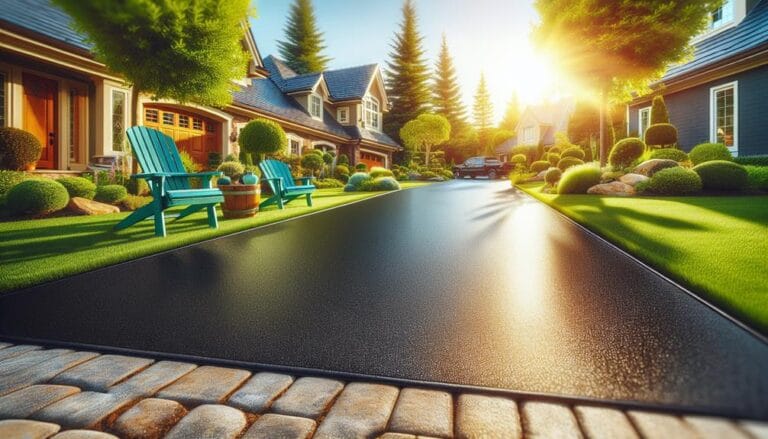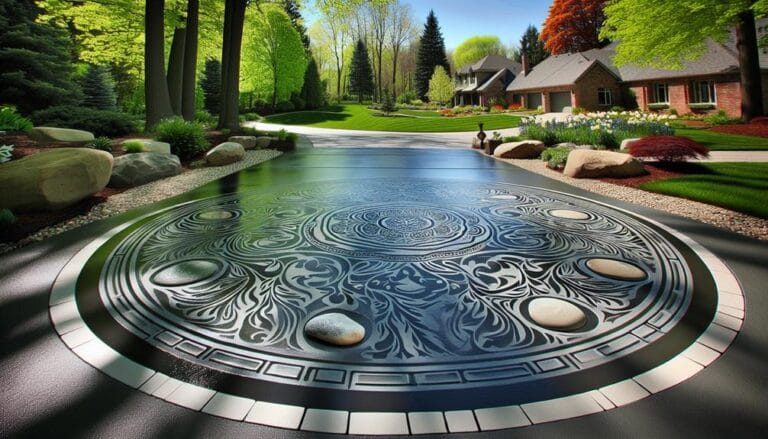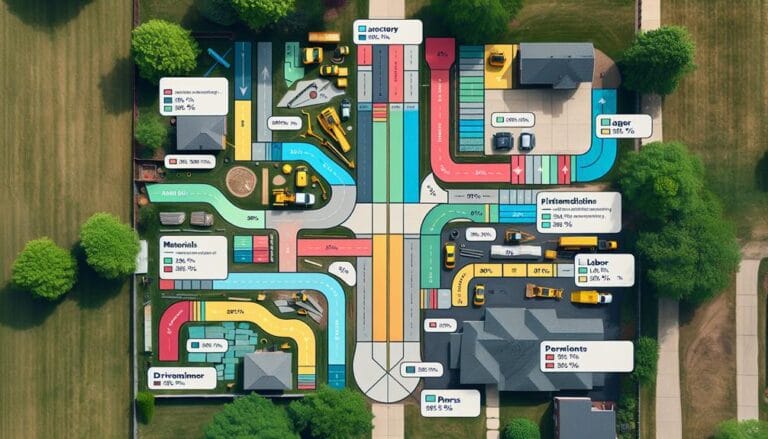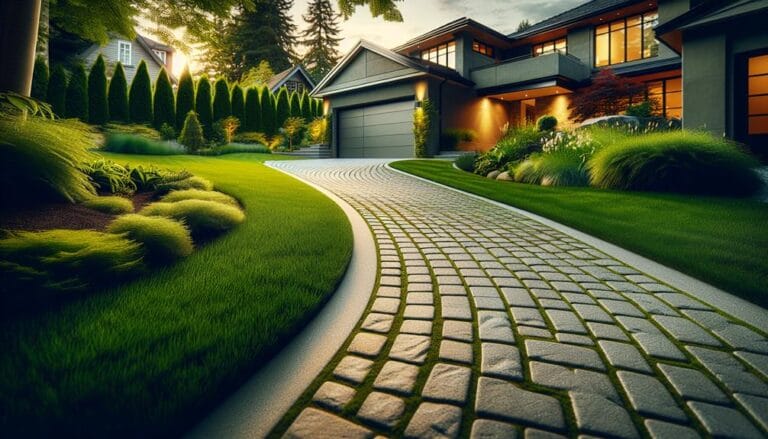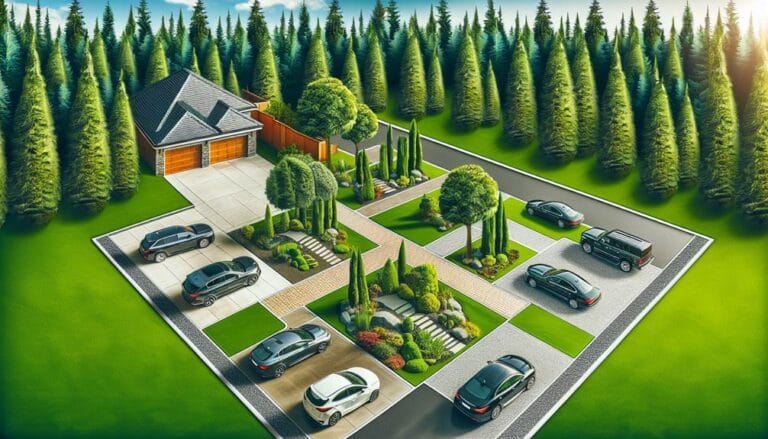Why Seal Your Driveway?
Sealing our driveway is a smart investment that can greatly extend its lifespan, enhance its appearance, improve safety, and prevent costly repairs. It shields our driveway from environmental damage like UV rays, rain, and snow, which can cause cracks and potholes. Sealcoating acts as a waterproof barrier that prevents water seepage and shifting caused by freeze-thaw cycles. By doing so, it maintains structural integrity, enhances aesthetics with a dark, rich finish, and minimizes future maintenance needs. If we want to get the most out of our driveway, we need to understand the full benefits this simple yet vital step provides. Let's take a closer look.
Key Takeaways
- Sealing extends the lifespan of the driveway, reducing long-term repair costs and preventing structural problems.
- Sealing protects the driveway from environmental damage, such as weather, UV rays, and substances that cause staining and erosion.
- Sealing ensures the driveway remains secure and functional by preventing shifting and collapse due to weather and traffic.
- A sealed driveway requires less maintenance and less frequent repairs, saving time and money.
Benefits of Sealing Cracks
When it comes to prolonging the lifespan of our driveway, sealing cracks is the single most cost-effective solution, because it prevents water from seeping into the pavement, which can lead to further damage and expense. We often overlook the importance of crack maintenance until significant issues arise. However, a well-planned sealing strategy can guarantee that minor cracks do not escalate into major problems. By sealing these cracks regularly, we can avert the constant pressure on the pavement and save ourselves a fortune in repair costs down the line.
Moreover, sealing techniques designed to address cracks can also enhance the overall appearance of our driveway, giving it a smooth finish that does not only improve its looks but also boosts its durability. This proactive approach helps us avoid dealing with more extensive and costly repairs such as pothole formation and creation of deeper structural issues like alligator cracking.
How Sealing Prevents Shifting
By sealing our driveway, we effectively maintain its structural integrity by preventing the shifting caused by weather and traffic. This is particularly significant in areas with seasonal weather patterns, where freeze-thaw cycles can have a significant impact on our driveway's stability.
Water seepage into small cracks is a major concern. When water freezes, it expands and pushes against the driveway materials, causing the surface to shift. This movement can lead to further deterioration and crack propagation, ultimately jeopardizing the driveway's foundation. Sealing our driveway guarantees that water cannot penetrate the cracks, preventing this destructive process from occurring.
In regions with harsh winters, this protection is even more vital. The freeze-thaw cycle can cause the ground to shift, which in turn causes the driveway to move. By sealing the driveway, we prevent this movement, thereby preserving its structure and extending its lifespan. Effective sealing is essential to safeguard our driveway against the elements and make sure it remains durable and stable.
The Role of Sealing
Sealing our driveway aims to protect it from the cumulative damage caused by exposure to the elements, traffic, and other external factors, ensuring its longer lifespan and structural integrity. This protection is essential to preserve the driveway's condition and prevent costly repairs or replacements. The sealing process involves applying specialized sealing materials that form a barrier between the driveway surface and the environment.
Here are some important aspects of driveway sealing:
- Weather Damage Prevention: Sealers protect the driveway from rain, snow, UV rays, and extreme temperatures.
- Stain Resistance: Sealing prevents oil and gas stains, making cleanup easier and reducing the risk of surface damage.
- Crack Prevention: Sealing helps to prevent cracks and potholes from forming due to water seepage and freeze-thaw cycles.
- Enhanced Appearance: A sealed driveway looks newer and smoother, enhancing the overall appearance of the property.
Exterior Sealing for Durability
We apply exterior sealing to mitigate the configurational vulnerabilities of our driveway, thereby fortifying its resilience against natural and human-induced stressors. Sealing our driveway provides effective weather resistance, which is essential in regions with extreme weather conditions. The sealant acts as a barrier, protecting the asphalt from water penetration, which can cause cracks and potholes. Additionally, sealing enhances the driveway's resistance to UV rays, chemicals, and other elements that can weaken the surface.
Regular sealing helps maintain a driveway's appearance and structure. This is particularly important for high-traffic areas or those exposed to chemicals, oil, and other substances that can cause damage. By sealing every two to three years, we guarantee the driveway remains protected and prevent expensive repairs. Moreover, sealing helps reduce maintenance frequency, allowing us to spend less time performing repairs and more time enjoying our outdoor spaces. This effort can greatly extend the life of our driveway, saving us money and time in the long run.
Protection for Decorative Finishes
Why Seal Your Driveway?
Protection for Decorative Finishes
How often does the finish of our driveway influence our satisfaction with its overall appearance? We often overlook the importance of decorative finishes when it comes to our driveways. A driveway's finish is more than just aesthetics; it can greatly impact its lifespan. Here are some key reasons why sealcoating is essential for maintaining a beautiful and durable driveway:
- Enhances Decorative Longevity: Sealcoating helps extend the life of decorative finishes by protecting them from water, UV rays, and chemicals.
- Easy Maintenance: Sealed driveways are easier to clean and maintain, saving us time and effort.
- Improved Appearance: A fresh coat of sealant revitalizes the appearance of the driveway, enhancing curb appeal and property value.
- Environmental Benefits: Sealcoating helps preserve the asphalt, reducing the need for frequent repairs and replacements, thereby reducing waste and supporting eco-friendliness.
Incorporating these maintenance tips into our routine will guarantee our driveways not only look fantastic but last longer too. It's time to give our driveways the protection they deserve.
Enhanced Aesthetics and Shine
When we visualize the perfect driveway, it's hard not to imagine a glistening surface that exudes elegance and sophistication. There is nothing like the visual appeal of a beautifully maintained driveway that enhances the entire look of our homes. One essential aspect of driveway maintenance that can greatly help us achieve this visual appeal is sealcoating. By sealing our driveways, we can revitalize their appearance and preserve their pristine condition.
Sealcoating provides an impressive aesthetic improvement by giving our driveway a dark, rich finish that systematically enhances curb appeal. It leaves the surface looking smooth and fresh, so much so that it can even increase the value of our property. Driveway sealant acts as a protective shield, not only saving us from costly repairs but also keeping our driveway looking like new for a longer period. This aligns perfectly with our vision of the perfect driveway. By investing in regular sealing, we can enjoy the shimmering allure of our driveway for years to come, adding a touch of sophistication to our homes.
Improved Safety of Cracks
Sealcoating our driveways provides improved safety by filling small cracks and sealing the surface to prevent water from seeping into these cracks. This markedly reduces the likelihood of slipping or tripping hazards, especially when the surface becomes wet due to rain or snowmelt. Cracks in unsealed driveways can amplify these issues by allowing water to seep in and expand when it freezes, making the cracks larger and more hazardous.
Here are some key benefits of sealcoating for crack maintenance and safety:
- Filled Cracks: Sealcoating fills small cracks, preventing water from entering and expanding them.
- No Ice Formation: By preventing water from seeping into cracks, sealcoating averts the formation of ice, which is a major safety concern during winter months.
- Uniform Surface: A sealed driveway provides a uniform, even surface, enhancing traction and reducing the likelihood of slips and falls.
- Reduced Maintenance: Sealcoating extends the life of your driveway, reducing the need for frequent repairs and the associated costs.
Avoiding Structural Damage
We can substantially extend the life of our driveway by preventing water and other damaging substances from seeping into its surface and causing structural damage. When water enters the cracks, it can erode the base and cause the asphalt to deteriorate, leading to severe damage and potentially even collapse. Regular sealing can notably reduce this risk by providing a waterproof barrier that shields the driveway from unwanted moisture.
Moreover, sealants enhance the driveway's moisture resistance, ensuring that water doesn't seep into the surface and cause cracks to expand. This protection greatly extends the driveway lifespan and prevents the need for costly repairs down the line. By sealing our driveway regularly, we not only protect its aesthetic appeal but also safeguard its structural integrity, ensuring it remains secure and functional for years to come.
Proper Subgrade Preparation
When considering sealing our driveways, it is essential not to overlook the critical step of proper subgrade preparation.
eredam, guaranteeing a solid foundation for the driveway or parking lot by accounted effectively reduces the likelihood of cracking and subsequent structural damage. A well-prepared subgrade guarantees that water doesn't accumulate beneath our driveway, which is critical given the freeze-thaw cycles that exacerbate moisture damage. Using appropriate subgrade materials and considering drainage are key.
- Proper Subgrade Materials: Choose materials that effectively back up your driveway by providing a stable, well-draining base.
- Compaction and Leveling: Guarantee proper compaction and leveling to create an even surface, preventing uneven settling and subsequent cracks.
- Drainage Considerations: Guarantee that water drains efficiently from the subgrade to prevent water accumulation and erosion.
- Structural Integrity: Prevent structural damage by guaranteeing the subgrade can support the weight of the asphalt, vehicles, and other loads.
Frequently Asked Questions
Should I Seal a Brand New Driveway?
We should wait about a year or until after the first winter before sealing a brand new driveway. This helps maintain its longevity and reveals various sealing benefits like protecting from wear and tear.
How Quickly Should I Seal a Driveway After Repairs?
"After repairs, we usually seal the driveway to protect it from further damage. We recommend sealing within a few months to maintain the surface and enhance its overall appearance."
Is It Best to Seal a Driveway in Hot or Cold Weather?
We think it's best to seal a driveway in hot weather, around 75-90 degrees Fahrenheit, with ideal weather conditions that guarantee a successful sealcoat application, enduring protection, and less likelihood of issues like peeling and flaking.
Can I Seal a Driveway Myself, or Should I Hire a Pro?
'Sealing a driveway is like painting a masterpiece; you can do it yourself but poor technique may ruin it. We prefer hiring pros for a flawless finish, but DIY enthusiasts can guarantee a quality job with proper prep, temp checks, and the right products.'
How Long Does a Driveway Sealcoat Typically Last?
Generally, a sealcoat can last two to three years depending on traffic and weather conditions, but reapplying every year guarantees maximum protection.

